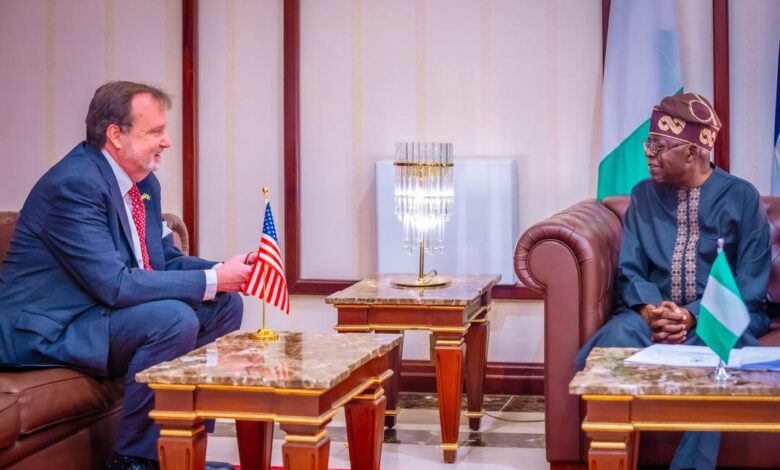
American businesses are increasingly wary of investing in Nigeria due to complex regulations, policy unpredictability, and trade barriers, according to U.S. Ambassador to Nigeria, Richard Mills.
Speaking in Lagos on Thursday during a fireside chat, Mills raised concerns that Nigeria’s current business environment poses significant risks for U.S. investors, even as Washington shifts its focus from aid to commerce in Africa through its newly announced “Commercial Diplomacy Strategy for Sub-Saharan Africa.”
The strategy seeks to recast African countries as equal trade and investment partners.
“We’re engaging African nations not as aid recipients, but as capable commercial partners.
“But success depends on Nigeria’s ability to win investor confidence,” Mills stated.
Mills pointed to persistent challenges deterring American firms, including shifting foreign exchange policies, port congestion, conflicting regulatory mandates, and an overbearing tax regime.
In some cases, he said, these issues have driven U.S. companies out of Nigeria after years of losses, while others have adopted a more cautious stance.
Citing alarming figures, Mills said some American businesses operating in Nigeria have faced up to 67 separate taxes, including bizarre levies such as fees for wheelbarrows.
He warned that such conditions are likely to spook the estimated 300,000 U.S. export-ready firms now eyeing opportunities in Africa.
His words: “When companies make decisions on where to do business, they seek out environments that are rules-based and predictable.
“The most common complaint I hear is that Nigeria’s regulatory environment lacks transparency—businesses don’t know when the rules will change.”
Despite the challenges, Mills noted that U.S. capital remains dominant in Nigeria’s booming tech sector, where 60 percent of venture capital funding originates from American sources.
He also criticized Nigeria’s agricultural trade policies, specifically import bans and tariff structures that restrict U.S. goods from entering the market—policies the U.S. believes are counterproductive to food security.
He said: “Import tariffs are restricting Nigeria from bringing in agricultural products that could boost local food production.
“Come back to us and address the trade barriers to U.S. imports into Nigeria, so we can make those tariffs go away.”
Addressing speculation that the renewed U.S. focus on Africa is aimed at countering China’s growing influence, Mills dismissed the notion of a geopolitical rivalry.
His words: “We’re not asking Nigeria to choose a side. We just want Nigeria to make informed decisions. If the government knows who’s building the bridge or supplying the infrastructure, that’s fine—but the free market will choose the best option, and often, that’s the American one.”

Nigeria does not need American investors to survive. It’s time for Africans to realize that the West are bent on sucking the continent dry, their treasuries are filled with stolen treasures from Africa, and it’s not enough, until they put us back in chains. Our leaders must be careful how they deal with these snakes. For any aid you receive, there is a price you must pay. It’s like eating with the devil.⛓️
TO EAT WITH DEVIL GET LONG SPOON. APOSTOLIC REVIVAL MOVEMENT REMARK. APC ON TOP